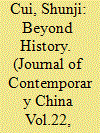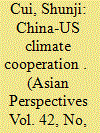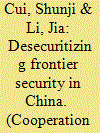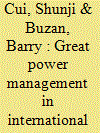|
|
|
Sort Order |
|
|
|
Items / Page
|
|
|
|
|
|
|
| Srl | Item |
| 1 |
ID:
123704


|
|
|
|
|
| Publication |
2013.
|
| Summary/Abstract |
This article takes the proposition that cooperation in the area of non-traditional security (NTS) can provide the essential window of opportunity for Northeast Asians to move beyond history. To demonstrate, it explores the development of NTS cooperation in Northeast Asia, paying particular attention to Sino-Japanese cooperation in the environmental and disaster areas. It then examines the relationship between NTS cooperation and the construction of a regional international society in Northeast Asia. It argues that the importance of NTS cooperation is twofold. First, in a region where historical animosities remain high, NTS issues can avoid sensitive areas and find common ground for cooperation that traditional security approaches would be unable to envisage. Second, NTS cooperation has turned people-to-people relations in a more prominent and conciliatory direction, and enhanced human security consideration, thus taking things further than the indirect consequences of functionalism.
|
|
|
|
|
|
|
|
|
|
|
|
|
|
|
|
| 2 |
ID:
159166


|
|
|
|
|
| Summary/Abstract |
Building “a new model of major-country relations,” particularly with the United States, has become one of China's major foreign policy objectives. Yet, outside of China, the concept is often seen as an empty slogan with no practical utility. By examining both the concept of the new model of major-country relations (NMMCR) and China's climate cooperation with the United States, I argue that the concept and initiative of NMMCR—with its emphasis on a common fate and shared futures, viewed as a means of achieving cooperation rather than conflict to achieve common goals— reflects well the changing environment of the twenty-first century and is thus a positive new development in China's foreign policy.
|
|
|
|
|
|
|
|
|
|
|
|
|
|
|
|
| 3 |
ID:
131261


|
|
|
|
|
| Publication |
2014.
|
| Summary/Abstract |
Developments in the East China Sea disputes in recent years appear to have set back Northeast Asian regional integration. Are there ways of turning these negative developments into more positive ones? Taking the Ecuador-Peru territorial dispute as a model, I consider the possibility of conflict transformation for the East China Sea dispute. The Ecuador-Peru border dispute was the most protracted in the Western Hemisphere, yet a peace agreement was finally reached in 1998, suggesting that even the most deeply ingrained differences and most persistent disputes can be transformed and ultimately overcome.
|
|
|
|
|
|
|
|
|
|
|
|
|
|
|
|
| 4 |
ID:
105955


|
|
|
|
|
| Publication |
2011.
|
| Summary/Abstract |
Should 'security' or 'securitization' be accorded positive or negative value? The Copenhagen School prefers desecuritization (positive value) to securitization (negative value). By examining securitization and desecuritization processes in China's approach to frontier security, the Copenhagen School argues that, in general, a strategy of desecuritization has proved effective. However, that does not mean that desecuritization should be seen as inherently positive; indeed, China's desecuritization strategy still encounters problems. To build conditions for a lasting frontier security, it is necessary to go beyond the current state-centric national security discourse and to give more attention to the societal security of the frontier people, their identity and culture. Thus, it is suggested in this article that frontier security studies should transcend 'positive-negative' debates and focus more on the 'referent object' of security: who and what we really want to secure and the means by which these objectives can be achieved.
|
|
|
|
|
|
|
|
|
|
|
|
|
|
|
|
| 5 |
ID:
145549


|
|
|
|
|
| Summary/Abstract |
This article is a contribution to the English School’s theory of primary institutions. It offers an historical and structural enquiry into the meaning of great power management (GPM) as a primary institution of international society as it has evolved since the 18th century. We seek to uncover the driving forces that shape this primary institution, and how they are redefining its legitimacy in the 21st century. We are particularly interested in uncovering whether and how particular conditions in international systems/societies facilitate or obstruct the operation of GPM. The article examines how system structures, both material and ideational, have set different conditions for GPM. Using the evolution from traditional to non-traditional security as a template, it sets out the main functions that have evolved for GPM. It shows how the institution has different meanings and roles at different times, and how they play into the legitimacy that GPM requires. It considers how GPM works at both regional and global levels, and concludes by looking ahead at the prospects for GPM, and opening a discussion on how to relate GPM to global governance.
|
|
|
|
|
|
|
|
|
|
|
|
|
|
|
|
|
|
|
|
|